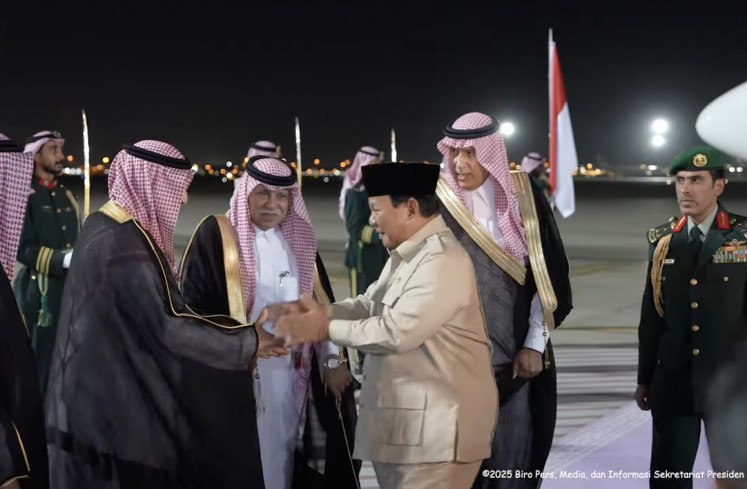Popular Reads
Top Results
Can't find what you're looking for?
View all search resultsPopular Reads
Top Results
Can't find what you're looking for?
View all search resultsDirect or indirect election: Does it matter?
One key piece of legislation the House of Representatives (DPR) has to finish this year relates to local elections (pilkada)
Change text size
Gift Premium Articles
to Anyone

O
ne key piece of legislation the House of Representatives (DPR) has to finish this year relates to local elections (pilkada). The major controversy within this bill is the proposal by the government, in particular the Home Ministry to change the direct election of the governor to an indirect election by the provincial legislature (DPRD I).
The reason why this debate reemerged is because the Constitution only stipulates that governors, as well as regents, should be elected democratically, without further specifying what “democratic” actually means; i.e. whether democratic can only mean a direct election by the people.
The argument rejecting the indirect election proposal starts with charging it as a backward step for democracy. The opponents of this proposal prefer a model of democracy that promotes direct participation of the people in as many political processes as possible.
The proponent of indirect elections argues, quite rightly, that direct democracy is not the only model of democracy.
While representative democracy does not always effectively represent (and often distorts) the people’s aspirations, it can be a valid alternative, and in many cases a better alternative — particularly in situations with high political uncertainty and where voters are not yet ready to effectively participate in a direct election.
The Constitutional Court released its interpretation on this issue in 2004, saying that the word “democratic” in the Constitution can mean both direct and indirect mechanisms for elections. This in turn becomes the legal grounds of the current Home Ministry proposal of indirect election of governors.
The Ministry of Home Affairs argues that an indirect gubernatorial election can help minimize one of the biggest problems in Indonesia’s democracy: Money politics. However, this argument has been easily refuted, and even the minister himself has admitted that money politics will only be limited in the regional legislatures (DPRDs).
In other words, instead of helping minimize money politics, the indirect election will only shift money politics from the voters back to the DPRD and political parties.
Beyond money politics, those who reject the indirect election mechanism are concerned with the increasing dominance of the political parties, which have been proven to be very undependable in performing their democratic roles.
Minimizing the costs for implementing democracy is another reason why the government is eager to use the indirect election mechanism.
While it is true that indirect elections can help minimize costs, conducting elections simultaneously at the district/municipality and the provincial level is another alternative to minimizing costs without having to eliminate the people’s participation.
The fact that governors act more as a representative of the central government to the regions than representatives of the people is another justification for using the indirect election mechanism.
This, however, has the potential to create another problem in the relationship across institutions. If governors are indirectly elected, it will worsen their coordination function in relation to the regents who have the direct mandate of the people. The reverse is also problematic. If the governors are directly elected, in many cases they feel that they are not susceptible to the accountability mechanism of the DPRD and often ignore the DPRD.
There are several lessons we can take from the debate outlined above. It is difficult to argue this case normatively, meaning from the perspective on which is more democratic. What we know is that in order for an institution to function as intended, it often requires prerequisites.
For example, money politics will not be solved by continually changing the electoral mechanism from indirect to direct and back to indirect. Minimizing money politics requires strict monitoring mechanisms and heavy punishments for those who participate.
Since the two options can be valid and more preferable in different situations, and the fact that there are significant variations across provinces and districts/municipalities in Indonesia, implementing a more specific and unique option instead of forcing a generalized political institution needs to be considered.
For example, while Law No. 21/2001 on Papua’s Special Autonomy states that the role of DPRD Papua is to elect the governor, it has been revised by Law No. 35/2008 to adopt a more generalized regulation, i.e. direct election of the governor, without considering why Papua adopted an indirect mechanism in the first place and without asking whether Papua has the prerequisites for a direct election mechanism to function well.
In a more practical sense, the aim of political decentralization is to bring the government closer to the people and in turn improve local governance.
However, whatever the electoral mechanism is, if the quality of the candidates is low, it is difficult to expect local governance to improve. One short term solution that could have a revolutionary impact is to consider a radical option, i.e. for all who want to be candidates to publicly announce their wealth, and prove that their wealth had been lawfully obtained.
The writer is a researcher in the Department of Politics and International Relations at CSIS Jakarta. He is a PhD Candidate at Northern Illinois University.









